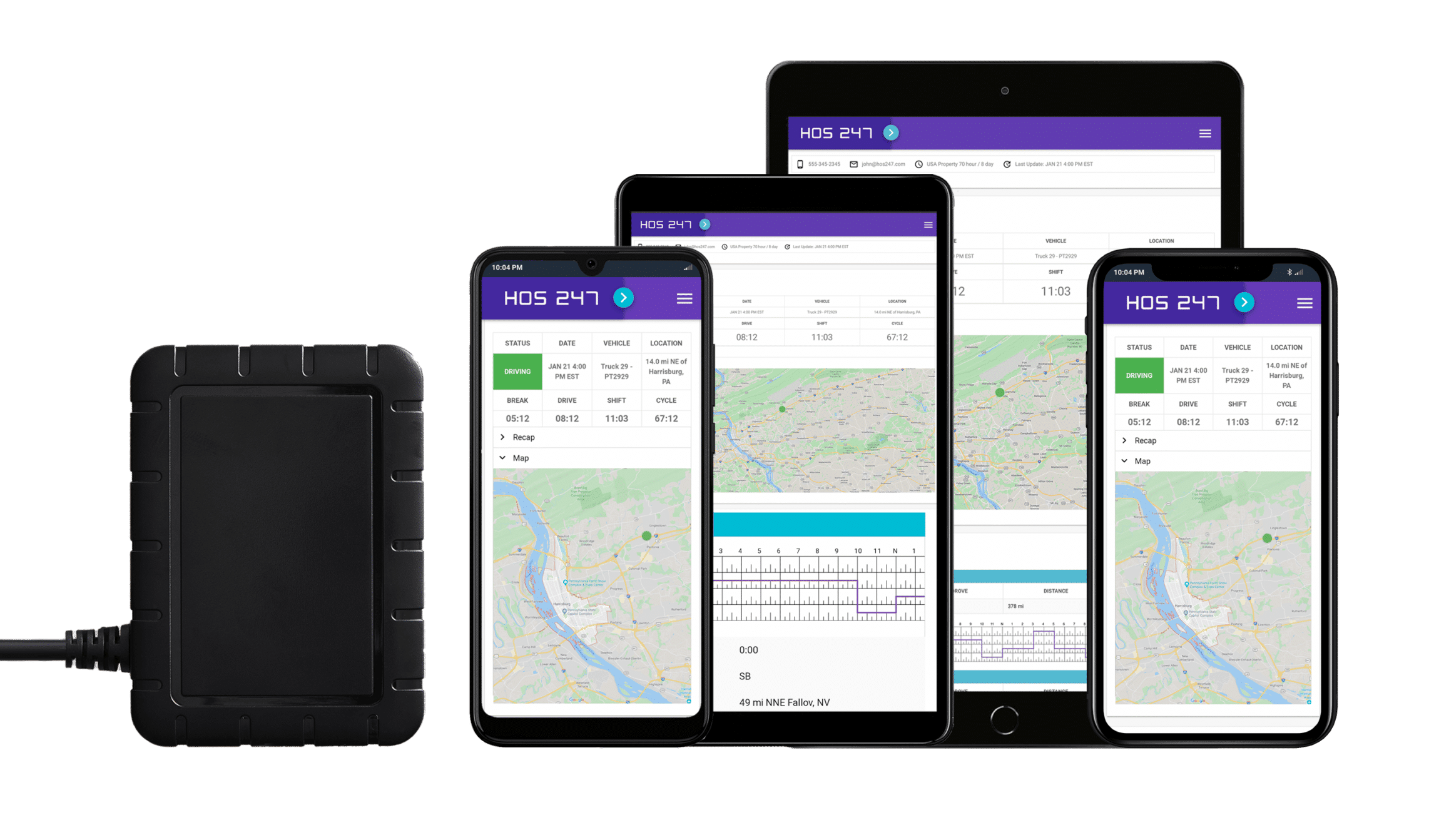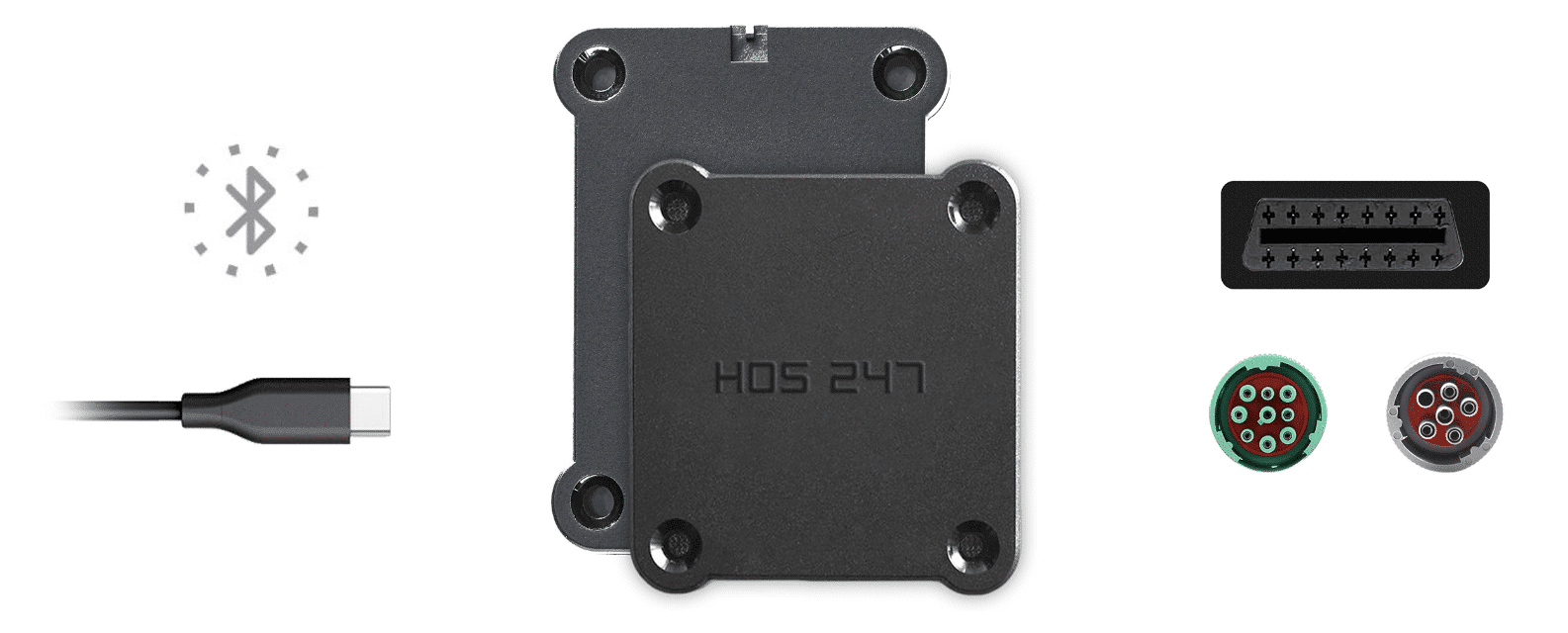Truckers appreciate GPS fleet management systems for various reasons: workflow optimization and considerable cost savings are among the main arguments in their favor. Devices that offer real-time tracking help motor carriers gain complete control over their operations, increasing the security of drivers, vehicles, and assets, improving customer service, and automating paperwork.
Using GPS based fleet management systems, carriers can reduce fuel expenses by monitoring and coaching drivers in case of speeding and idling. Automated maintenance alerts based on the precise vehicle data collected by the system can prevent costly repairs and prolong vehicle lifespan. A reliable GPS fleet management system may also protect drivers from false complaints.
If this small device has the potential to significantly boost productivity and ensure safety of your operations, it makes sense to invest some time in searching for a GPS tracking system that is a good match for your business. In this article, we will discuss different aspects of fleet tracking and how to find the optimal solution for your fleet.
Do you have any questions? Talk to ELD Advisor: 650-405-3372 or Request Callback
Features of a Reliable GPS Fleet Management System
A GPS based fleet management system is expected to provide full fleet visibility, prolong the vehicle’s lifespan and cut overall expenses. What are the features that allow a GPS device to help with these tasks?
Real-Time GPS Tracking
With a real-time GPS fleet management system, motor carriers can accurately track their vehicles, effectively plan their routes for dispatch and maintain transparency in communication with their clients. Using telematics technology, the GPS device collects location data of the vehicle and shares it on the fleet manager portal allowing supervisors to make on-demand administrative decisions.
Apart from accurate vehicle location monitoring, the system uses real-time alerts to notify motor carriers in case of possible theft or accident. Concealed GPS devices track the truck even if the electronic logging device is turned off, helping recover stolen assets and increasing the security of the fleet.
Vehicle Maintenance
Maintenance is another crucial feature of a GPS fleet management system. It tracks maintenance routines, including license renewals, tire rotations, warranty expirations, and oil changes, among others, establishing service schedules based on mileage, hours of usage, or scheduled dates. Keeping and analyzing the data collected from all past service history, the system automatically inputs maintenance events for all vehicles in the fleet, sending reminders about upcoming events.

Fault Code Detection
This feature recognizes vehicle malfunctions and notifies the driver about the detected fault via a system of codes. If a GPS fleet management system is enhanced with telematics technology, the alert can be also sent directly to the maintenance department. Together with the vehicle maintenance system, fault code detection enhances vehicle endurance, allowing business owners to save considerable amounts of money on serious repairs.
Automated Idle Tracking
Fuel waste caused by idling can result in serious expenses that the idle tracking feature can significantly reduce. A GPS based fleet management system sends the office automatic alerts notifying supervisors when the vehicle exceeds set speed limits or idle time. Hence, fleet managers get a chance to correct drivers’ behavior, and motor carriers reduce their carbon footprint.
User-Friendly Software
A GPS fleet management system is only as good as its interface. Modern systems provide intuitive fleet manager portals accessible through any web browser, eliminating the need for specialized software installations. Mobile apps allow managers and drivers to access critical information on the go. The best platforms feature customizable dashboards that display the metrics most important to your operation — no searching through complex menus. Real-time updates sync across all devices, ensuring everyone works with the same current information.
Compliance Tools Integration
GPS tracking systems that integrate with compliance tools streamline regulatory management. The system connects seamlessly with ELDs, automatically pulling HOS data for comprehensive reporting. Integration with drug and alcohol testing databases, driver qualification file management, and permit tracking creates a single compliance hub. This consolidated approach reduces duplicate data entry and ensures nothing falls through the cracks during inspections or audits.
IFTA Calculations
Automated IFTA reporting saves hours of manual calculations each quarter. GPS fleet management systems track mileage by state automatically, recording every border crossing with precision. The system generates IFTA reports that break down taxable and non-taxable miles, fuel purchases by jurisdiction, and MPG calculations. Motor carriers can export reports in formats ready for filing, turning a dreaded quarterly task into a simple download. This automation not only saves time but also reduces costly calculation errors that can trigger audits.
Dispatch Optimization
Smart dispatch features transform how fleets assign and manage loads. Having all relevant information at hand — driver locations, HOS availability, and vehicle capacity — fleet managers can make optimal load assignments. Real-time traffic data helps dispatchers reroute drivers around delays, maintaining delivery windows. GPS lets dispatchers know when drivers complete deliveries or encounter issues, enabling quick decision-making.

Benefits of HOS247 Fleet Management GPS Software
HOS247 is a top-rated fleet services provider with GPS tracking that offers all the essential services that boost productivity and reduce operational costs. Among the benefits HOS247 GPS tracking provides are:
- Top-rated customer support. Our team of experts is available to help you troubleshoot any day of the week. Our reps are knowledgeable, will call you back if the call drops, and speak English, Spanish, Polish, and Russian.
- Accessible fleet manager portal. Supervisors can access the online portal through any browser. The intuitive interface allows monitoring of all vehicles and drivers with a few clicks.
- Easy-to-install hardware. With our GPS fleet management system, motor carriers can forget about problems related to installation. The HOS247 GPS tracking hardware doesn’t require special installation and can be set up in minutes by any staff member.
- 24/7 security. Our hardwired tracker connects to the vehicle and has an added battery, allowing motor carriers to monitor the vehicle and assets even during off-hours. The system will notify supervisors via the fleet manager portal if the truck is driven in an authorized direction or gets into an accident, helping prevent theft and providing extra security for the driver and vehicle.
- 4G technology. Our GPS solution is enhanced with a 4G receiver that provides a reliable connection even through adverse weather conditions.
- Improved customer service. Real-time tracking allows better planning for drivers, dispatch, and improving communication between motor carriers and clients. The system can also protect drivers from false claims, providing precise reports based on the collected data.
- Reduced expenses. The HOS247 GPS tracking helps considerably cut expenses related to maintenance, fuel, insurance, and penalties.
With HOS247, motor carriers get a complete fleet management solution that pays for itself through reduced costs and improved efficiency. Our combination of reliable hardware, intuitive software, and exceptional support helps fleets of all sizes operate safer, smarter, and more profitably.
Do You Need GPS to Comply with the ELD Mandate?
To comply with the regulations issued by the FMCSA it is enough to have an ELD with a built-in GPS. This kind of trackers have an accuracy level of approximately 10 miles, allowing access to basic information about the vehicle’s location, but lacking all the benefits of a GPS based fleet management system.
The elog suppresses the signal on purpose to give truck drivers more privacy. To fully enjoy the perks of GPS fleet tracking, motor carriers are advised to purchase a hardwired GPS separately from the electronic logbook.
DOT Compliance and Safety Benefits
A reliable GPS fleet management system transforms DOT compliance from a headache into an automated process. Motor carriers using GPS tracking can focus on their operations while the system handles documentation and reporting requirements automatically.
FMCSA Compliance Requirements
Meeting FMCSA standards becomes simple with GPS fleet management. The system automatically maintains accurate records of vehicle movements, driver activities, and maintenance schedules. Fleet managers can generate compliant reports with a few clicks, eliminating manual paperwork and reducing the risk of violations. The GPS device tracks everything inspectors need to see, keeping your fleet audit-ready at all times.
Hours of Service (HOS) Tracking
GPS tracking systems work seamlessly with electronic logging devices to monitor HOS in real-time. Drivers receive alerts before reaching their daily or weekly limits, helping them plan rest breaks effectively. Fleet managers get instant notifications about potential violations, allowing them to reassign loads or adjust schedules immediately. This proactive approach maximizes driving time while ensuring complete compliance with HOS regulations.
Electronic DVIR Automation
Paper DVIRs are outdated and risky. Modern GPS fleet management systems digitize the entire inspection process. Drivers complete pre-trip and post-trip inspections on mobile devices, with automatic time-stamping and location tracking. Any defects trigger immediate alerts to maintenance teams. The system stores all DVIRs digitally, making them instantly accessible during roadside inspections or audits.
CSA Score Improvement
GPS tracking directly improves multiple CSA BASIC categories:
- Monitors speeding and harsh braking to improve Unsafe Driving scores
- Sends maintenance alerts to prevent Vehicle Maintenance violations
- Ensures HOS compliance automatically
- Provides data to dispute false violations
Better CSA scores lead to more contracts and lower insurance premiums. The system shows exactly where improvements are needed, turning CSA management into a data-driven process.
Audit Preparation and Documentation
When DOT auditors arrive, GPS fleet management systems have everything ready. All required documents — maintenance records, driver logs, inspection reports, route histories — are organized and accessible within seconds. The system generates audit reports for any time period, demonstrating consistent compliance. This level of preparation often results in shorter, smoother audits.

Improve Your Operations and Safety with HOS247
Besides a reliable GPS fleet management system, HOS247 offers an elog solution that ensures compliance with the ELD mandate and improves your business operations’ efficiency. Our system helps operators:
- Prevent HOS violations with automatic alerts. The system monitors driving hours in real-time and notifies drivers before they risk violations, giving them time to find safe parking and plan their routes effectively.
- Manage electronic logs and driver vehicle inspection reports with ease. Digital logs eliminate paperwork errors and lost documents, while automated DVIRs ensure inspection compliance without the hassle of carbon copies.
- Streamline workflows by automating IFTA calculations. The system tracks state-by-state mileage automatically to make tax filing easier, saving hours of manual calculations and reducing audit risks.
- Lower CSA scores. By preventing violations and maintaining accurate records, the system helps improve scores across multiple BASIC categories, leading to better contracts and lower insurance rates.
- Reduce DOT audit risk. All compliance documents stay organized and accessible in one place, making audits faster and less stressful with instant report generation for any time period.
When combined with our GPS tracking solution, HOS247 creates a complete fleet management system that drivers appreciate and managers rely on. The integrated platform reduces complexity, cuts costs, and keeps your fleet moving efficiently while staying fully compliant.
Implementation and Training Best Practices
Getting your fleet up and running with GPS tracking doesn’t have to be complicated. Modern systems are designed for quick setup and easy adoption, allowing carriers to start seeing benefits immediately.
Quick Installation Process
Today’s GPS devices install in minutes, not hours. Plug-and-play options connect directly to the diagnostic port — no special tools or expertise required. Hardwired units take under 30 minutes per vehicle. Most carriers complete installation using their own staff, avoiding expensive technician fees. For larger fleets, staggered installation keeps operations running while vehicles are equipped gradually.
Driver Adoption Strategies
Successful GPS implementation starts with driver buy-in. Key strategies include:
- Involve senior drivers in system selection.
- Emphasize driver benefits: protection from false claims, simplified logging, better routing.
- Address privacy concerns openly and honestly.
- Start with volunteers before fleet-wide rollout.
- Recognize drivers who embrace the system early.
When drivers understand how GPS tracking helps them personally, resistance turns into enthusiasm.
Change Management Tips
Smooth transitions require clear communication and realistic timelines. Focus on benefits like improved safety and reduced paperwork rather than surveillance. Establish clear policies about data usage upfront. Use GPS data for coaching in the early stages, not punishment. Regular feedback sessions help identify and fix problems quickly. Appointing driver champions creates peer support that accelerates adoption.
Training Resources and Support
Effective training turns GPS tracking into a productivity tool:
- Provide role-specific training (drivers vs. dispatchers vs. maintenance).
- Use multiple formats: videos, hands-on practice, quick reference cards.
- Take advantage of provider resources like webinars and documentation.
- Create a mentorship program for new users.
- Schedule refresher training for new features.
Most GPS providers offer extensive support — use it fully to maximize your investment.
Common Implementation Challenges and Solutions
Every fleet faces similar obstacles when implementing GPS tracking. Knowing these challenges ahead of time helps you prepare solutions and avoid delays.
- Driver resistance. Show how the system protects them and simplifies their work rather than focusing on monitoring.
- Technical issues. Choose systems with offline capabilities and multiple network options for rural coverage.
- Budget concerns. Demonstrate ROI through fuel savings and reduced violations — most fleets see payback within six months.
- Integration problems. Start with basic tracking, then add features gradually as comfort grows.
- Data overload. Focus on key metrics first, expanding analysis over time.
- Micromanagement concerns. Establish policies limiting real-time monitoring to specific situations like customer inquiries.
By addressing these challenges proactively, carriers transform GPS implementation from a potential disruption into a smooth enhancement of their operations.
Benefits of HOS247 Customer Care Policies
HOS247 is an experienced ELD provider top-rated by truckers. Besides the reliability of our ELD and GPS solutions, we offer customer-centered service to fit the needs of every client.

We work hard to create optimal customer care conditions for your business to flourish:
- Professional customer service. In HOS247, we understand the importance of technical support for the trucking business. Our support team will assist you in training, troubleshooting, and resolving any doubts related to compliance issues and the everyday use of our products. Our multilingual team speaks English, Spanish, Russian, and Polish. Our technical support service is available from Monday through Sunday.
- Callback policy. Our clients do not have to worry about hanging on the phone for hours or explaining their issues twice. If the phone call gets interrupted, our customer support manager will reach out immediately.
- No contract policy. Another reason our clients appreciate HOS247 is our flexible subscription plans that can be paid for on a monthly or yearly basis. You can easily change or cancel your plan without paying any additional fee.
- One-year hardware replacement warranty. We ensure the reliability of our products. If our device presents a malfunction, we will provide a replacement at no cost.
- Two-week trial and demos. Request your demo to familiarize yourself with our system and see how much your business can grow with HOS247. With our hassle-free two-week return policy, you can have your money back if you decide they don’t suit your needs.
At HOS247, we believe great technology needs great support. Our customer-first policies ensure you’re never locked into contracts, never stuck on hold, and never left without help when you need it. This commitment to service excellence is why truckers consistently rate us as a top ELD and GPS provider.
Conclusion
Finding the right GPS fleet management system can transform your trucking business from reactive to proactive. With features like real-time tracking, automated compliance, and predictive maintenance, modern GPS solutions eliminate guesswork and reduce operational costs significantly. The key is choosing a provider that combines reliable technology with genuine support for truckers.
Selecting a reliable GPS provider makes the difference between a system that gathers dust and one that becomes essential to your operations. Look for providers offering proven hardware that works in all conditions, responsive customer support that speaks your language, and flexible contracts that don’t lock you in for years. The best providers understand trucking challenges and design their systems accordingly — simple installation, intuitive interfaces, and integration with tools you already use. Your GPS investment should deliver immediate value, not endless headaches.
Ready to see how GPS fleet management can improve your operations? Request a demo today and experience HOS247’s difference with our two-week trial. Take control of your fleet’s future with technology that works as hard as you do.

I’ve co-founded, built and managed several transportation-related businesses. Now, I’m a founder and CEO of HOS247 – an AI Transportation Platform for trucking companies, freight brokers and other logistics operations. We are transitioning old-style operations to technology-advanced logistics entities and help them to grow their businesses. ELDs (electronic logging devices), fleet tracking and management 2.0 combined with AI-powered dispatch tools.












Driving a commercial motor vehicle (CMV) across the United States involves more than just steering a wheel – it requires a deep understanding of the intricate road rules, particularly compliance with federal hours of service (HOS) regulations. In this article,

The ELD Mandate is a fact of life for most drivers and trucking companies. This article presents some guidelines on how to choose ELD devices, how to stay on top of a trucking company and driver regulatory needs, who must

In the world of commercial trucking, staying on top of regulations is key to smooth operations. The electronic logging device (ELD) mandate, enforced by the Federal Motor Carrier Safety Administration (FMCSA), has reshaped how drivers and carriers track hours of